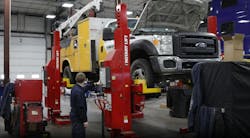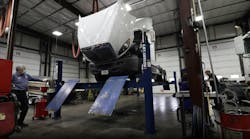Fifty-year-old truck shop shares technician retention tips
In this article, you'll learn:
- Bascom Truck & Auto's hiring techniques for new and veteran technicians
- How the small shop retains its employees for decades
- How to leverage technician pay to increase productivity
In 1975, young diesel technician Dick Bascom decided to strike out on his own. He had only graduated from high school two years earlier—and got married shortly after. And over the previous year, Bascom took auto repair classes at the local community college during the day and maintained trucks at night. Now he felt ready to be his own boss and rented a 4,500-sq.ft. space in Des Moines, Iowa from the freight company he wrenched for to open his own shop, called Bascom Truck & Automotive, Inc.
Keeping a business afloat is difficult at any age, but Bascom has made it work going on 50 years. The building's size worked for nearly two decades, but trucks are big and business was good. So with 10 technicians on staff, the team often found themselves fixing tractors in the parking lot.
"We were stumbling over each other and it was crowded," Bascom recalled. So the business moved to a new 11,000 sq.-ft. building in 1999, which has since added 14,000 sq. ft. more. They serve mostly freight companies and other fleets, as well as owner-operators, and pickup and passenger car owners.
Now Bascom has 25,000 sq.-ft. of space, a parts department, four service trucks, and about 35 employees. This includes his two children, Mike Bascom, who serves as general manager, and Mandy McWilliams, VP of finance and human resources.
But while Bascom has achieved success, that doesn’t mean everything’s easy. The shop owner and his son and daughter described their challenges running a shop on a January virtual roundtable with Fullbay, a provider of heavy-duty shop management software. They noted (no surpirse) that hiring technicians, particularly younger ones, has been challenging.
“We're seeing that the younger generation is a lot more likely to move around, so it takes a different mindset and a different process to retain them,” said the elder Bascom, who himself has been a fixture in Des Moines.
But even considering these cultural shifts that have made technician retention more difficult, Bascom's Truck & Auto has a strong record of keeping the people they hire. McWilliams recalled that a few years ago, the shop celebrated the retirement of a couple employees that had both spent their entire careers with the shop, a career that spanned 40-some years.
"Our current longest-term employee is celebrating 35 years," she said, adding there are a number of employees that have also spent the last decade or two with the shop.
How have the Bascoms achieved this kind of loyalty? Making sure their technicians know they have a future with the shop helps, with Bascom investing in his employees' careers and training along with the shop itself.
Retaining the next generation
Bascom is clearly great at keeping the older techs, but what about those just coming into the industry?
It's important to know what they want. For example, according to WrenchWay's 2025 Voice of Technician report, 92% of technicians and 94% of students want a well-documented career path. Bascom's Truck & Auto has that baked in from the start. McWilliams noted the shop always try to make their commitment to their new hires clear.
“We're trying to help our younger people see that they can build a career at our shop, that they don't need to go somewhere else to be successful, that they can grow and move up and earn more money,” she said. “I don't want anyone to ever have to leave our shop to earn the money that they deserve.”
Another key thing WrenchWay found technicians looked for in a shop is when they wouldn't be there, with 94% of technicians preferring not to work weekends. Bascom guarantees this as the shop is closed on Saturday and Sunday, and even closes early on Friday. Bascom is even able to tie technician career progression and free weekends together through how he structures the shop's night shift.
For younger technicians, a key part of their career structure is working toward the day shift. At Bascom Truck & Auto, the day shift works Monday through Friday, while the night shift works Monday through Thursday from 3 p.m. to 1 a.m. Typically, the shop always hires to the night shift first, then when a position opens on the day shift, technicians have the option to move up based on seniority.
For both new and verteran technicians, the extra weekend day is a big draw, Bascom noted. "We have people that live 50 miles away or 75 miles away, so that's one less time that they have to drive in by working on the night shift," he explained.
Even for those who don't have a long hike to work each day (or night), the extra time off of work gives them more time to pursue their passion. As an example, one of the shop's long-running employees (35 years) is a mountain biker, and he recently chose to move to the night shift because "he likes to go to these meets on the weekends, and [the night shift] gives him a longer weekend," Bascom said.
This schedule works well for students, as the shop has a partnership with the diesel program at the local community college, and usually has at least two students working at any given time. The night shift allows students to come to the shop once they finish their classes and then "work whatever they're comfortable with to be able to get any homework done or to be able to get up and be on time and functioning the next day," Mike Bascom stated.
“Our night foreman has the heart of a teacher, and he really takes these young guys under his wing and offers a lot of advice and education along the way,” McWilliams added. “And that's been really helpful for our younger techs and for the shop as a whole.”
In this way, the night shift gives younger technicians both a strong starting career goal to work towards and a safe space to learn, especially when they’re right out of school.
And to incentivize the young technicians' mentors, Bascom also has their lead techs clock on to the job they’re helping with, so they're credited for their time. Meanwhile, the student technicians are paid per hour, albeit at a lesser rate, so they’re still paid to learn but don't break the bank for the shop.
Plus while working on the night shift, young technicians handle a lot of PM services to give them the exposure and experience they need, Mike Bascom added. This experience is supplemented with bite-sized, app-based training from Today’s Class, which the shop requires from every technician. To complete this training, the technician only needs to log in, read the material, and answer five questions a day. Then, they can do more coursework afterward if they like.
The convenience of Today's Class is helpful, Bascom's son noted, because “it's difficult as an independent [shop] to find off-site training.”
And it looks like these efforts are paying off, as currently, five of the shop's current techs are 25 years old or less.
Financing new hires
For standard new hires, Bascom noted that there’s a fine balance to consider when it’s time to hire a new technician, with factors such as the shop's workload, overtime, turned-away work, and investment capital.
“My point is that when we hire a person, we have to have the capital to be able to fund that hire,” he said.
However, guaranteeing that the new technician will immediately have their hands full of work isn’t one of Bascom’s hiring considerations. Instead, if he thinks the shop can financially handle a new hire, they’ll do it, “because we find that when we have the extra staff, we will accept more work when it comes along than if we didn't have that staff. And so pretty soon, that person's completely busy.”
This is partially because Bascom aims to have his technicians maintain high productivity levels (and why the 11,000 sq.-ft. shop wasn't cutting it). When discussing productivity, the shop refers to a tech's utilization vs. billable hours.
McWilliams said that "We want [the utilization rate] to be 90% or above. And then of the time they're clocked onto a ticket, we want to bill 90% of that or above."
As for the hiring process itself, this, too, is an investment for the shop, McWilliams said. The siblings use a combination of processes when making a new hire, including a mechanical aptitude test and a behavior assessment, called Job Behaviors, to see if they’ll fit the culture. Then, they give candidates a shop tour so that they can see the types of vehicles they would work on—which is almost everything.
“Anything under the sun could be [in the shop],” McWilliams stated. “And that's not right for everybody, but it is right for some.”
Finally, the prospective technician also has interviews with Mike Bascom, McWilliams, and the manager they’d be working with. While this process is long, according to the Bascoms, their thoroughness has meant that they don’t generally need to fire people.
“Most of the time, when people leave, I think it's a generational thing, rather than the shop culture,” the GM said.
Bascom Truck & Auto's benefits:
- Competitive Wages
- Weekends off
- 4-day week available
- Full or part-time hours
- 401(k) savings plan
- Employee discounts
- Health insurance
- Free Life insurance
- Flex Plan
- 8 paid holidays
- Uniforms and uniform maintenance
- Paid time off
- Free short and long-term disability
- Continuing education
- Bonus program
Incentivizing tech productivity
Of course, part of the shop’s tech retention is their pay. The shop uses an hourly pay schedule with a productivity bonus, so if a technician is able to do a job that’s meant to take four hours in three, they’re paid for the fourth hour anyway.
“Having an opportunity to earn that extra hour of bonus money keeps them doing the best they can, and that's really the only reason that you're paying off of a flat rate anyway,” Bascom stated.
But on the flip side, if a technician is having trouble with a job, the productivity bonus doesn’t pressure them into rushing their work as a flat-rate system might, since they’re not losing money. Either way, McWilliams uses Fullbay to identify the bonus a technician receives for the jobs they closed the week before, based on how much time they spent on a job compared to how much time they billed the customer.
"I pull that data out of Fullbay every week when I run payroll, spin it through some Excel spreadsheets, and they each get a paper every week showing [which jobs] billed," she said.
Additionally, Bascom explained that team leaders in the shop not only get bonuses for their efforts but for their team’s work, too. This helps keep team leads engaged and their coworkers productive since they always have someone there to help and who'll curb too many water cooler conversations or phone breaks.
Customer management
Of course, the other side of Bascom's growth and the benefits he offers his technicians is making sure he treats his customers right, too. In particular, this means that the shop needs to be careful when setting its labor rates. While some shops might look to their competition to understand how much they should charge, Bascom doesn’t prefer this method.
“The challenge with [that] method … is that assumes that my competition knows how to set their rates, and I'm not so confident that they do,” he quipped.
Instead, Bascom monitors his shop’s fixed and variable costs, ranging from employee pay to taxes. He also wants to ensure his investments in his shop and equipment are making a proper return and that the shop is turning a fair profit. By adding those elements together and dividing that among the number of hours the shop’s historically been able to sell, Bascom determines what he thinks he needs to charge per hour.
“Then we take that number and we look at the competition and say, ‘Does that compete in the market?’” he asked. “If it does compete in the market, we're on our way.”
Then there’s the delicate question of how to handle customer relations while still holding to the operational math he’s done.
As an example, Bascom told the story of how three of their freight customers, who were each receiving a discounted rate, merged into one, becoming 30% of Bascom’s business at the time. Reportedly, the fleet’s maintenance manager came to Bascom asking for a better rate and proposed one that Bascom knew was below their operating costs. The fleet argued that the number of work hours they’d bring in would make the rate worth it, but Bascom held firm.
“We had to hold the line, because if we had just looked at the volume of revenue that they would bring in, without regard to what it cost us to get that revenue, then we would have operated at a loss every time we worked on their trucks, and we wouldn't be able to sustain that,” he said.
So, the company went elsewhere. Bascom was transparent with his technicians about what was happening and explained why he had to limit their hours to no more than 40 while they filled the gap, but fill it they did.
“Now all three of those freight companies are gone, and we're still there,” Bascom concluded. “You have to have the courage to make decisions that will keep you profitable, even though it may cost you revenue in the short run.”
About the Author

Alex Keenan
Alex Keenan is an Associate Editor for Fleet Maintenance magazine. She has written on a variety of topics for the past several years and recently joined the transportation industry, reviewing content covering technician challenges and breaking industry news. She holds a bachelor's degree in English from Colorado State University in Fort Collins, Colorado.


